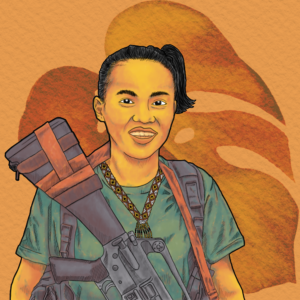Message of Solidarity to All Proletarian Revolutionaries, Trade Unionists and All Workers of the Philippines In celebration of the 120th Founding Anniversray of the Union Obrera Democratica de Filipinas (UODF)
Today, I am happy to join all proletarian revolutionaries, trade unionists and workers in celebrating the 120th anniversary of the Founding Congress of the Union Obrera Democratica de Filipinas (UODF, the first labor congress establishing the first labor federation in the Philippines. The Congress was convened upon the initiative of Isabelo de los Reyes and 140 delegates from trade unions headed by the Union de Litografos e Impresores de Filipinas.
They were inspired by the Marxist slogan of the First International, “The emancipation of the working class must be the task of the workers themselves”. They approved the UODF Constitution which embodied the principles adopted from the books Vida e Obras de.Carlos Marx by Friedrich Engels and Los Dos Campesinos by the Italian radical socialist, Malatesta.
All the speakers in the Congress attacked US imperialism and demanded the national independence of the Philippines. They put forward the political and economic demands of the labor movement and underscored the call of the UODF for the Filipino proletariat and people to struggle for national independence.
They were under surveillance by the spies of the US colonial government who tagged them as “subversives” and “anarchists”. Governor General Taft directly ordered their blacklisting and further surveillance. US imperialism was hostile to their patriotism and class-conscious struggle and prepared its instruments of coercion and suppression.
The UODF organized a mass rally of 50,000 participants on July 4, 1902 and demanded independence for the Philippines. Then on August 2, 1902, it carried out the first general strike of the Filipino labor movement against the rejection of the demand for a general wage increase as an adjustment to the inflationary crisis.
The US colonial government retaliated by charging Isabelo de los Reyes with sedition and rebellion and convicted him upon the false witness of a secret service man. The charges and conviction were based on a Spanish conspiracy law. De los Reyes was compelled to resign from the UODF to concentrate on his religious activity in the Philippine Independent Church. Dr. Dominador Gomez replaced him as the UODF president.
The UODF was not discouraged by colonial repression but grew by leaps and bounds from 33 unions in 1902 to 150 unions in 1903. It had 20,000 members in Manila and had 150,000 members in eight provinces in Luzon. On May 1, 1903, it defied the refusal of the US colonial authorities to give a rally permit and staged a demonstration of 100,000 workers to celebrate labor day for the first time in the Philippines in front of Malacanang palace and the workers shouted: “Down with US imperialism!”
Within the same month of May 1903, the home of Dr. Gomez and the printing press where the UOD organ was printed were simultaneously raided by American and Filipino policemen in violation of the right to home and the right of free press and free assembly.
Like his predecessor Isabelo de los Reyes, Gomez was charged with “sedition” and illegal association.” He was arrested and sentenced to forced labor. Like De los Reyes, he was acquitted on the condition that he resign from UODF. Upon his resignation, unions began disaffiliating from UODF.
After the crackdown on the UODF, which was intended to silence anti-imperialist workers, the agents of the American Federation of Labor tried to take over the Philippine trade union movement and to propagate the bourgeois-liberal concept that labor be separated from political activity and that it be always in unity with capital.
The UOD disintegrated but positive and negative lessons could be learned from the disintegration in order to further advance the labor movement in the Philippines. The Filipino working class would continue striving to develop their trade unions and federate to form a labor center.
On May 1, 1913, the Congreso Obrero de Filipinas was founded. Eventually, Crisanto Evangelista was elected its president on March 1, 1918. Subsequently, he established the Partido Obrero in 1922, the precursor of the Communist Party of the Philippine Islands. The brilliant and militant proletarian leader Evangelista proceeded to establish the Communist Party of the Philippine Islands (CPPI) in 1930.
This is the antecedent of today’s Communist Party of the Philippines (CPP), which was re-established on December 16, 1986 under the guidance of Marxism-Leninism-Maoism. It is the advanced detachment of the proletariat and is leading and waging the people’s democratic revolution through protracted people’s war.
It has won great victories by wielding revolutionary armed struggle and the united front as weapons. It has built on a nationwide scale the Party organization at various levels, the New People’s Army, the revolutionary mass organizations, the National Democratic Front of the Philippines and the organs of political power that constitute the people’s democratic government.
To this day, the Communist Party of the Philippines honors the founders and all trade unionists of the UODF as pioneers of the modern trade union federation. Their pioneering example and their achievements are a necessary part of the history of the labor movement in the Philippines that brought about the emergence of the revolutionary party of the proletariat.
The founders of the UODF continue to inspire the Filipino working class to develop the trade union movement and the revolutionary party of the proletariat, advance the people’s struggle for national and social liberation, win total victory until the socialist revolution can commence and contribute to the resurgence of the proletarian-socialist revolution.
Long live the memory of the Union Obrera Democratica de Filipinas!
Long live the Filipino proletariat and people!
Long live the Philippine revolution and the world proletarian revolution!




